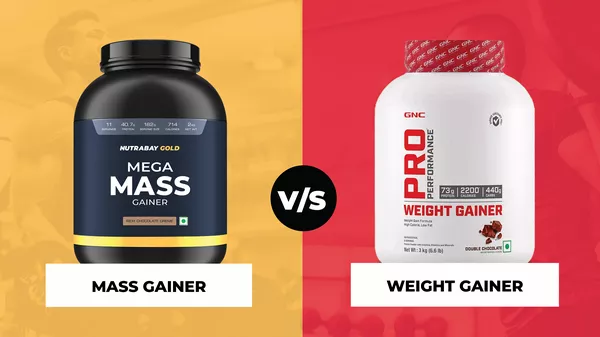In the realm of sports nutrition, the quest for optimal muscle growth and weight gain often leads individuals to explore the realm of supplements. Among these, mass gainers and weight gainers stand out as popular choices. Both promise to support muscle growth and weight gain, but they have distinct compositions and target different fitness goals. In this comprehensive comparison, we’ll delve into the nuances of mass gainers and weight gainers to help you make an informed decision.
Define and Differentiate:
1. Mass Gainers:
Mass gainers are specially formulated supplements designed to provide a high calorie intake, primarily targeting individuals looking to build muscle mass. They typically contain a balanced ratio of macronutrients, with emphasis on protein and carbohydrates, along with moderate amounts of fats. The protein sources often include whey, casein, or a blend of both, while carbohydrates are derived from sources like maltodextrin or oats.
2. Weight Gainers:
On the other hand, weight gainers are tailored for individuals seeking to increase overall body weight, including both muscle mass and fat. These supplements are characterized by their higher calorie content compared to mass gainers, achieved through a greater proportion of carbohydrates and fats. Protein content may be slightly lower in weight gainers compared to mass gainers, although they still provide a significant amount to support muscle growth.
Target Audience:
1. Mass Gainers: Ideal for individuals with ectomorphic body types (those who struggle to gain weight and muscle) and athletes engaging in intense resistance training. They are best suited for those aiming to increase muscle mass while minimizing fat gain.
2. Weight Gainers: Targeted towards individuals with high metabolic rates or those with difficulty consuming enough calories from whole foods alone. They are suitable for individuals looking to increase overall body weight, including both muscle and fat.
Compare and Contrast:
1. Calorie Content:
Mass gainers typically provide around 500 to 1,200 calories per serving, whereas weight gainers can range from 600 to 1,500 calories per serving. The higher calorie content of weight gainers makes them more suitable for individuals with higher caloric requirements or those with particularly fast metabolisms.
2. Macronutrient Profile:
Mass gainers tend to have a balanced macronutrient profile, with a higher emphasis on protein to support muscle repair and growth. Weight gainers, on the other hand, prioritize carbohydrates and fats to provide a significant calorie boost. This difference in macronutrient ratios impacts energy levels and muscle-building potential.
3. Additional Ingredients:
Both mass gainers and weight gainers may contain additional ingredients such as creatine, glutamine, or digestive enzymes. These ingredients can enhance muscle recovery, improve nutrient absorption, and support overall health. However, the specific blend of additional ingredients may vary between products, so it’s essential to carefully review the label.
Considerations and Recommendations:
1. Individual Fitness Goals:
When selecting between mass gainers and weight gainers, it’s crucial to align the choice with your specific fitness goals. If your primary aim is to increase muscle mass while minimizing fat gain, opt for a mass gainer. For those seeking overall weight gain, including both muscle and fat, a weight gainer may be more suitable.
2. Body Composition and Activity Level:
Individuals with ectomorphic body types or those engaging in intense resistance training may benefit more from mass gainers due to their higher protein content and emphasis on muscle building. Conversely, individuals with higher metabolic rates or those with difficulty gaining weight may find weight gainers more effective in meeting their calorie requirements.
3. Dietary Needs and Restrictions:
Consider any dietary restrictions or preferences when choosing between mass gainers and weight gainers. Many products offer vegan or vegetarian options, as well as alternatives for individuals with specific allergens or dietary restrictions. Additionally, pay attention to ingredient labels to ensure compatibility with your dietary needs.
4. Budget and Cost-Effectiveness:
Compare the price points of mass gainers and weight gainers to determine the most cost-effective option based on your individual needs. While weight gainers may offer a higher calorie-to-cost ratio, mass gainers provide a more targeted approach for muscle growth, potentially yielding better long-term results.
Additional Tips:
1. Importance of a Balanced Diet:
Remember that both mass gainers and weight gainers are supplements and should not replace a balanced diet. Whole foods should remain the foundation of your nutrition plan, with supplements used to complement and enhance your dietary intake.
2. Exercise and Training:
To maximize the benefits of mass gainers or weight gainers, combine their use with a structured exercise program. Resistance training stimulates muscle growth, while cardiovascular exercise supports overall health and metabolism.
3. Potential Side Effects:
Be aware of potential side effects such as bloating or digestive discomfort, particularly when first introducing these supplements into your diet. Start with smaller servings and gradually increase as tolerated to minimize any adverse effects.
Conclusion
In conclusion, the choice between mass gainers and weight gainers depends on your individual goals, body type, and dietary preferences. Mass gainers are tailored for muscle building, with a balanced macronutrient profile ideal for individuals seeking to increase muscle mass. Weight gainers, on the other hand, provide a higher calorie intake, making them suitable for those aiming for overall weight gain.
For ectomorphic individuals or athletes engaged in intense training, mass gainers offer a targeted approach to muscle growth. Alternatively, individuals with higher caloric needs or difficulty gaining weight may find weight gainers more effective in meeting their nutritional requirements.
Ultimately, the best choice depends on your specific goals and circumstances. Consider your dietary needs, budget, and long-term fitness objectives when selecting between mass gainers and weight gainers. For further information and personalized guidance, consult with a qualified nutritionist or fitness professional.


























